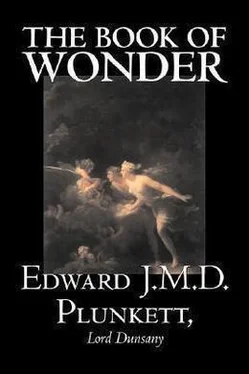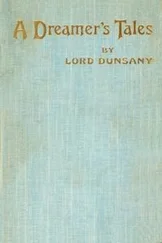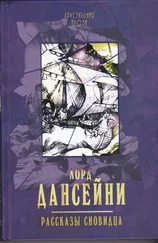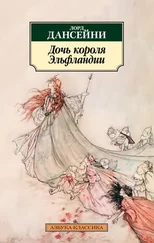There watched him ceaselessly from the Under Pits those eyes whose duty it is; from further within and deeper, the bats that dwell there arose when they saw the surprise in the eyes; the sentinels on the bulwarks beheld that stream of bats and lifted up their spears as it were for war. Nevertheless when they perceived that that war for which they watched was not now come upon them, they lowered their spears and suffered him to enter, and he passed whirring through the earthward gateway. Even so he came, as foretold, to the City of Never perched upon Toldenarba, and saw late twilight on those pinnacles that know no other light. All the domes were of copper, but the spires on their summits were gold. Little steps of onyx ran all this way and that. With cobbled agates were its streets a glory. Through small square panes of rose–quartz the citizens looked from their houses. To them as they looked abroad the World far–off seemed happy. Clad though that city was in one robe always, in twilight, yet was its beauty worthy of even so lovely a wonder: city and twilight were both peerless but for each other. Built of a stone unknown in the world we tread were its bastions, quarried we know not where, but called by the gnomes abyx , it so flashed back to the twilight its glories, colour for colour, that none can say of them where their boundary is, and which the eternal twilight, and which the City of Never; they are the twin–born children, the fairest daughters of Wonder. Time had been there, but not to work destruction; he had turned to a fair, pale green the domes that were made of copper, the rest he had left untouched, even he, the destroyer of cities, by what bribe I know not averted. Nevertheless they often wept in Never for change and passing away, mourning catastrophes in other worlds, and they built temples sometimes to ruined stars that had fallen flaming down from the Milky Way, giving them worship still when by us long since forgotten. Other temples they have—who knows to what divinities?
And he that was destined alone of men to come to the City of Never was well content to behold it as he trotted down its agate street, with the wings of his hippogriff furled, seeing at either side of him marvel on marvel of which even China is ignorant. Then as he neared the city's further rampart by which no inhabitant stirred, and looked in a direction to which no houses faced with any rose–pink windows, he suddenly saw far–off, dwarfing the mountains, an even greater city. Whether that city was built upon the twilight or whether it rose from the coasts of some other world he did not know. He saw it dominate the City of Never, and strove to reach it; but at this unmeasured home of unknown colossi the hippogriff shied frantically, and neither the magic halter nor anything that he did could make the monster face it. At last, from the City of Never's lonely outskirts where no inhabitants walked, the rider turned slowly earthward. He knew now why all the windows faced this way—the denizens of the twilight gazed at the world and not at a greater than them. Then from the last step of the earthward stairway, like lead past the Under Pits and down the glittering face of Toldenarba, down from the overshadowed glories of the gold–tipped City of Never and out of perpetual twilight, swooped the man on his winged monster: the wind that slept at the time leaped up like a dog at their onrush, it uttered a cry and ran past them. Down on the World it was morning; night was roaming away with his cloak trailed behind him, white mists turned over and over as he went, the orb was grey but it glittered, lights blinked surprisingly in early windows, forth over wet, dim fields went cows from their houses: even in this hour touched the fields again the feet of the hippogriff. And the moment that the man dismounted and took off his magic halter the hippogriff flew slanting away with a whirr, going back to some airy dancing–place of his people.
And he that surmounted glittering Toldenarba and came alone of men to the City of Never has his name and his fame among nations; but he and the people of that twilit city well know two things unguessed by other men, they that there is another city fairer than theirs, and he—a deed unaccomplished.
The Coronation of Mr. Thomas Shap
It was the occupation of Mr. Thomas Shap to persuade customers that the goods were genuine and of an excellent quality, and that as regards the price their unspoken will was consulted. And in order to carry on this occupation he went by train very early every morning some few miles nearer to the City from the suburb in which he slept. This was the use to which he put his life.
From the moment when he first perceived (not as one reads a thing in a book, but as truths are revealed to one's instinct) the very beastliness of his occupation, and of the house that he slept in, its shape, make and pretensions, and even of the clothes that he wore; from that moment he withdrew his dreams from it, his fancies, his ambitions, everything in fact except that ponderable Mr. Shap that dressed in a frock–coat, bought tickets and handled money and could in turn be handled by the statistician. The priest's share in Mr. Shap, the share of the poet, never caught the early train to the City at all.
He used to take little flights of fancy at first, dwelt all day in his dreamy way on fields and rivers lying in the sunlight where it strikes the world more brilliantly further South. And then he began to imagine butterflies there; after that, silken people and the temples they built to their gods.
They noticed that he was silent, and even absent at times, but they found no fault with his behaviour with customers, to whom he remained as plausible as of old. So he dreamed for a year, and his fancy gained strength as he dreamed. He still read halfpenny papers in the train, still discussed the passing day's ephemeral topic, still voted at elections, though he no longer did these things with the whole Shap—his soul was no longer in them.
He had had a pleasant year, his imagination was all new to him still, and it had often discovered beautiful things away where it went, southeast at the edge of the twilight. And he had a matter–of–fact and logical mind, so that he often said, "Why should I pay my twopence at the electric theatre when I can see all sorts of things quite easily without?" Whatever he did was logical before anything else, and those that knew him always spoke of Shap as "a sound, sane, level–headed man."
On far the most important day of his life he went as usual to town by the early train to sell plausible articles to customers, while the spiritual Shap roamed off to fanciful lands. As he walked from the station, dreamy but wide awake, it suddenly struck him that the real Shap was not the one walking to Business in black and ugly clothes, but he who roamed along a jungle's edge near the ramparts of an old and Eastern city that rose up sheer from the sand, and against which the desert lapped with one eternal wave. He used to fancy the name of that city was Larkar. "After all, the fancy is as real as the body," he said with perfect logic. It was a dangerous theory.
For that other life that he led he realized, as in Business, the importance and value of method. He did not let his fancy roam too far until it perfectly knew its first surroundings. Particularly he avoided the jungle—he was not afraid to meet a tiger there (after all it was not real), but stranger things might crouch there. Slowly he built up Larkar: rampart by rampart, towers for archers, gateway of brass, and all. And then one day he argued, and quite rightly, that all the silk–clad people in its streets, their camels, their wares that came from Inkustahn, the city itself, were all the things of his will—and then he made himself King. He smiled after that when people did not raise their hats to him in the street, as he walked from the station to Business; but he was sufficiently practical to recognize that it was better not to talk of this to those that only knew him as Mr. Shap.
Читать дальше












